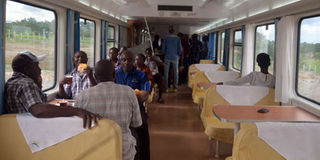Madaraka Express will not succeed where KR failed if the law is applied selectively

Passengers aboard the Madaraka Express train on June 8, 2017 from Mombasa to Nairobi. Madaraka Express will not succeed where Kenya Railways failed if the law is applied selectively. PHOTO | SALATON NJAU | NATION MEDIA GROUP
What you need to know:
- Politicians from Narok County have sponsored gangs of young people to disrupt operations in Suswa and Daraja Moja.
- People do not learn about supplying consumables to an SGR camp by invading it and beating up the residents.
I celebrated the advent of the 485-kilometre Mombasa-Nairobi Standard Gauge Railway; decried the fact that because its trains are diesel powered, it is a very expensive undertaking when compared to the electrified 756-kilometre Addis Ababa-Djibouti line; and warned that acquisition of land for the line was an out-and-out gravy train at the expense of the taxpayer.
When I wrote on my Facebook page last year that government would launch the SGR passenger service just before the General Election as a vote-seeking strategy and that the President would ride on the inaugural train, I was branded an apologist and hammered.
Well, allow me to revisit the matter but from two different perspectives; the past and the present.
TRAIN RIDE
Rewind to 1950. I have had the rare privilege to get a sneak preview of an upcoming book about Mr Burudi Nabwera, one of the noteworthy sons of Omuluhya, who served as independent Kenya’s first ambassador to the US and UN, MP for Lugari, Cabinet minister, Kanu boss and parastatal chief.
From 1950 through 1952, Mr Nabwera rode on the train from Webuye to Kampala.
Young Nabwera was a student at Makerere College.
MONEY STOLEN
Needless to say, there is no train between Webuye and Malaba.
Between 1965 and 1970, Mr James Orengo, then a student at Alliance High School, rode on the train from Yala to Kisumu thence Kikuyu and at a subsidised student’s fare.
Of course, there is no train service between Butere and Kisumu enroute to Nairobi any more.
It all started late in the 1970s when the defunct Hillary Ng’weno’s Weekly Review reported that a senior executive at the Kenya Railways had stolen an incredible Sh90 million.
END OF BUSINESS
The sad, bad and mad story of the once proud and beloved transit system started and, in the 1980s and 90s, the young people of Nairobi would declare, “reli imedead” (the railway is dead).
Needless to say, when Kenya Railways died, livelihoods were lost across the land because, for example, the towns that sprung up around and because of the stations declined as business dried up.
The transporters, fruit and vegetable vendors, eateries and kiosks went into a decline as did value of property.
Of course, the cost of commuting rose as did the cost of road maintenance.
PROJECT DERAILED
Fast-forward to the present. Work on the SGR line to Naivasha, which was launched late last year by President Kenyatta, has slowed down considerably.
Politicians from Narok County have sponsored gangs of young people to disrupt operations in Suswa and Daraja Moja.
The politicians and their hirelings are demanding that only local people be hired to work on SGR in their county.
It is right for local politicians to canvass jobs for their people.
EMPLOYMENT
But Narok leaders are, in effect, saying that when the stretch of SGR that passes through their land is finished, then, their sons and daughters will have no reason to want to continue to work on the line.
Why? Because going by this argument, their neighbours will demand and defend their exclusive turn to eat.
It is in order that Narok politicians demand that the SGR contractor hires their people.
But it is wrong for them to turn a blind eye to the fact that invading the contractor’s camp and causing bodily harm to Chinese staff is criminal.
WORKABLE AGREEMENT
It is important for the politicians to know that the contractor’s demand for specific skill sets for certain jobs cannot be vacated by violence.
The better route for better politicians would be to seek a joint meeting between Maasai leaders and their people and the Ministry of Transport and Infrastructure and openly discuss the opportunities available and how local people can take advantage of them.
People do not learn about supplying consumables, for example, to an SGR camp by invading it and beating up the residents.
Unfortunately, the politicians and their hirelings have not been arrested and arraigned for engaging in and promoting criminality, which suggests two things.
RULE OF LAW
One, the politicians have set aside their differences and united against a common enemy on this matter at this time when they desperately need to be seen to be working for their electors.
Two, police and the national administrative officers in the county have turned a blind eye to what amounts to sabotage of a strategic investment and violation of the law.
The law must not be applied selectively for the simple reason that all are equal before it.
Madaraka Express will not succeed where Kenya Railways failed if the law is applied selectively.
Opanga is a commentator with a bias for politics [email protected]





